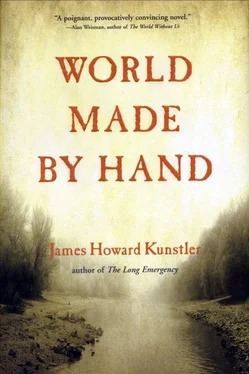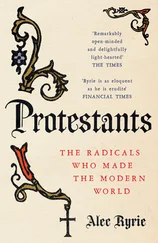I prepared to smoke the trout I had left from the evening’s fishing because they’d be worth something in trade and for breakfast I had plenty of eggs and the brown bread Jane Ann brought me. We didn’t have a lot of things, but we had plenty of eggs. Half the people in town kept chickens, and rabbits too, which was the reason I didn’t. Much of the year we had plenty of milk and butter as well, though milk was more difficult to keep in high summer because we lacked refrigeration. Butter in a covered crock would keep on a sideboard for a week or more, even in hot weather. Many farmers made cheeses and traded for them, and Bill Schroeder, who ran the creamery, made several kinds.
So I had two fires to get going that day: cookstove and smoker. I split up ash kindling splints and whittled down some of them to shavings and started a fire under the smoker with one match. You didn’t like to waste matches. I put apple wood chunks on the burning ash kindling and let it work. By then I had the cookstove kindled up and brought fire to it from the smoker, and soon they were both going.
I generally ate a big breakfast. The amount of walking I did required it. In the old days, as a corporate executive, I kept going on little more than continuous cups of black coffee until dinnertime. I had one of those steel thermal mugs you carried everywhere with you as a kind of signifier of how busy, and therefore how important, you were. The people in my office joked that my thermal mug was surgically attached to my arm. In those days, in a life that now seemed as if it had taken place on another planet, we lived in Brookline, Massachusetts, and I worked for a software company called Ellipses on Route 128. Our division made network security programs: antivirus, antispam, antihacker, firewalls. I was head of marketing and spent the bulk of my time organizing promotional events at national trade shows in places like Atlanta and Las Vegas. We’d pay big-time rock and roll bands to get the customers in for the CEO’s sales pitch. We’d buy out whole vintages of California wineries to impress our clients. We’d hire celebrity chefs to feed them. My job paid well and we enjoyed the status of a nice house, German cars, and private schools for the children. I multitasked so hard I had panic attacks. I suppose all the coffee I drank didn’t help. Then, within a short span of time, our world changed completely.
We came here, to Union Grove, Sandy’s hometown, after the bomb went off in Los Angeles. That act of jihad was extraordinarily successful. It tanked the whole U.S. economy. The ties finally had to start inspecting every shipping container that entered every harbor in the nation. Freighters anchored for weeks off Seattle, Norfolk, Baltimore, the Jersey terminals, Boston, and every other port of entry. Many of them eventually turned around and went home with their cargoes undelivered. The earth stopped being flat and became very round again. Even nations that were still talking to us after the war in the Holy Land, stopped being able to trade with us. Ellipses went down by stages, one division at a time. Ours was the last to go.
I was thirty-six then. We sold the house in Brookline at a substantial loss just to get out. We dumped the big BMW and kept the sedan. You could still get gasoline, though it was expensive and scarcities were worsening. We wanted to be as far away from the action as we could get without leaving the northeastern region of the country. Sandy’s father, Bill Trammel, was alive then, a retired vice president of the nearby Glens Falls National Bank. He was glad to have us all in the house in Union Grove because Sandy’s mother had died of cancer the year before, and it was a bad time to be old and lonely. Pneumonia took Bill two years after we arrived. Common antibiotics were in short supply. In a way, I was glad he went before Sandy and Genna and everything else that happened, because it would have broken his heart. He was absolutely a man of the twentieth century. His last coherent words, in the delirium of illness, were “Don’t worry, I’ll bring the car around…”
By the time he passed away, it was obvious there would be no return to “normality.” The economy wouldn’t be coming back. Globalism was over. The politicians and generals were failing to pull things together at the center. We would not be returning to Boston. The computer industry, in which so many hopes had been vested, was fading into history. I was fortunate to have carpentry skills to fall back on and to have a decent collection of hand tools.
The evangelist on the radio cut out, and I realized that the electricity had gone off. I felt relieved, even though I had only myself to blame for leaving the radio on. Listening to these maniacs had gotten to be a compulsion for me. I was desperate to learn anything about the world outside Washington County, because I worried constantly about my Daniel and where he might be, and whether it was dangerous there.
We didn’t have coffee anymore, or any caffeinated substitutes for it. I made a pot of rose-hip tea, which was our chief source of vitamin C, and fried up three slices of Jane Ann’s brown bread with plenty ofbutter in a cast-iron skillet that I had owned my entire adult life-I actually remembered buying it in a Target store in Hadley, Massachusetts, the year after I graduated from Amherst College. When the bread slices were crispy and fragrant, I took them out and dropped in three small pullet eggs. I missed black pepper terribly. We hadn’t seen any for years. Cinnamon too. Anything from the Far East was no longer available. But over the years I had developed some skill in brewing my own hot pepper sauce. It was worth something in trade. I put plenty on my eggs.
Once the radio went off you could hear roosters battling for supremacy of the village. Some people were annoyed by them, but I found them pleasantly reassuring. Their crowing and the vapors of the hot sauce helped clear enough room in my head to think about what I had to do. Planning my day was a way of not giving in to despair. It really is not possible to pay attention fully to two things at once-for instance, carpentry and suicide.
I had to continue the work I had started on a cupola above Larry and Sharon Prager’s garage, which they were turning back into a stable. Larry Prager was our dentist. With the electricity off most of the time, he did not have the high speed drill anymore. He got ahold of a 1920s pulley drill in Glens Falls, and Andrew Pendergast helped him rig it up to a foot treadle which Sharon could operate like a pump organ while she assisted her husband. He had become adept at working with gold in the absence of complex polymers and advanced cements. His patients usually brought in their own gold, most often jewelry, which he converted into castings or foils. For anesthesia he was limited to tinctures of opium and marijuana. Nobody looked forward to a session with Larry, but we were lucky to have a dentist.
The job on his cupola required trips to the sawmill and the general supply, often called simply “the general.” So, I tidied up the breakfast things, hung the trout in the smoker, tossed more apple wood on the smoldering embers, and washed myself in the outdoor shower I’d rigged up next to the summer kitchen. We were fortunate to still have running water in the village. The town established its water system in the early twentieth century. The reservoir lay a hundred feet higher in elevation above the village, so the system was gravity fed and still worked. It wasn’t treated anymore but it was good potable water-though the pressure was noticeably lower lately. I had a little sheet-metal tank with a firebox rigged above the shower, all held up on a steel pipe frame. It was such a warm morning that I didn’t bother firing it, and the cool water brisked me up. Finally, I put on my work clothes: cutoff denim shorts and what used to be a Brooks Brothers pink pinstripe dress shirt, now minus the sleeves.
Читать дальше












